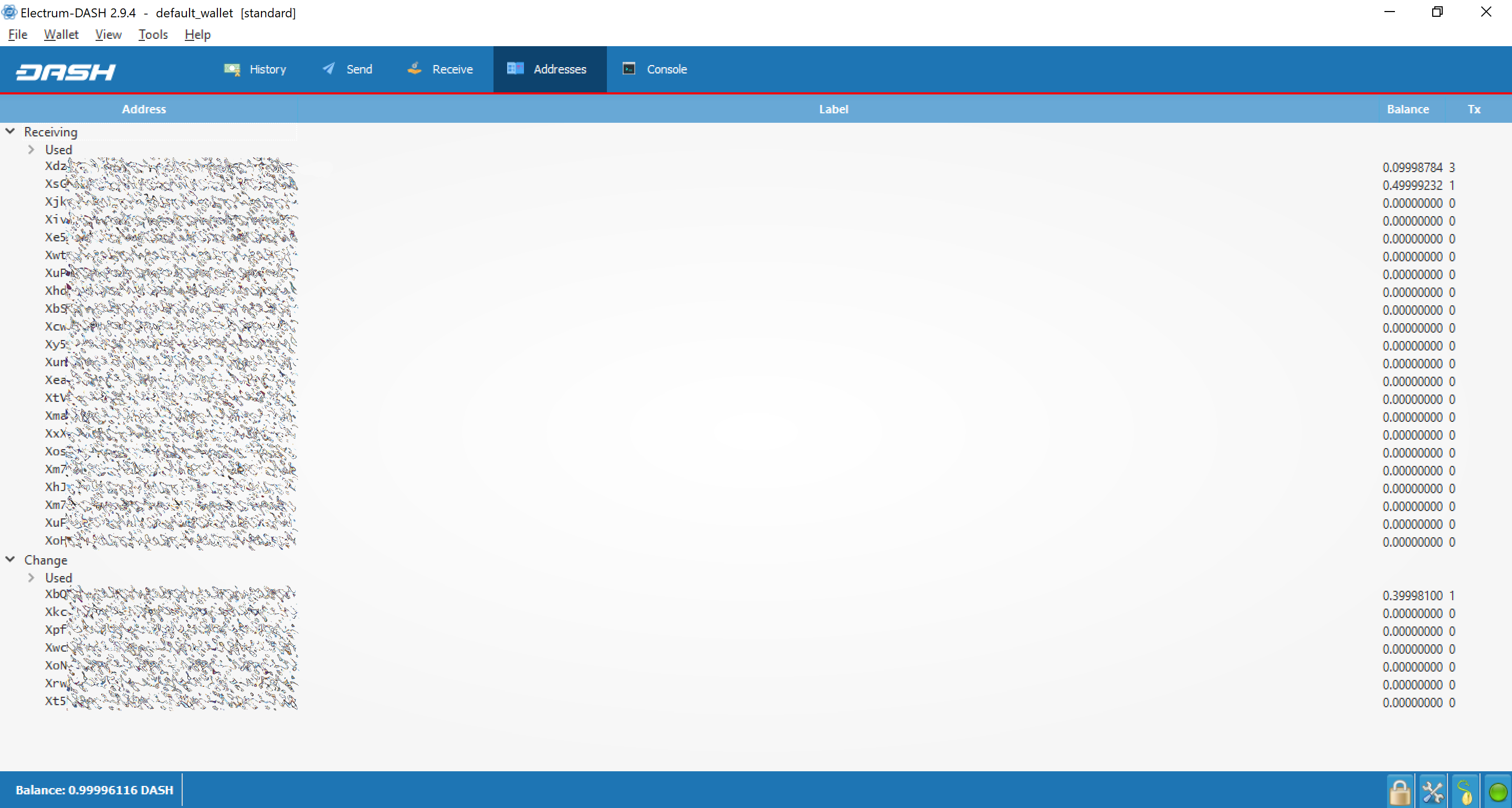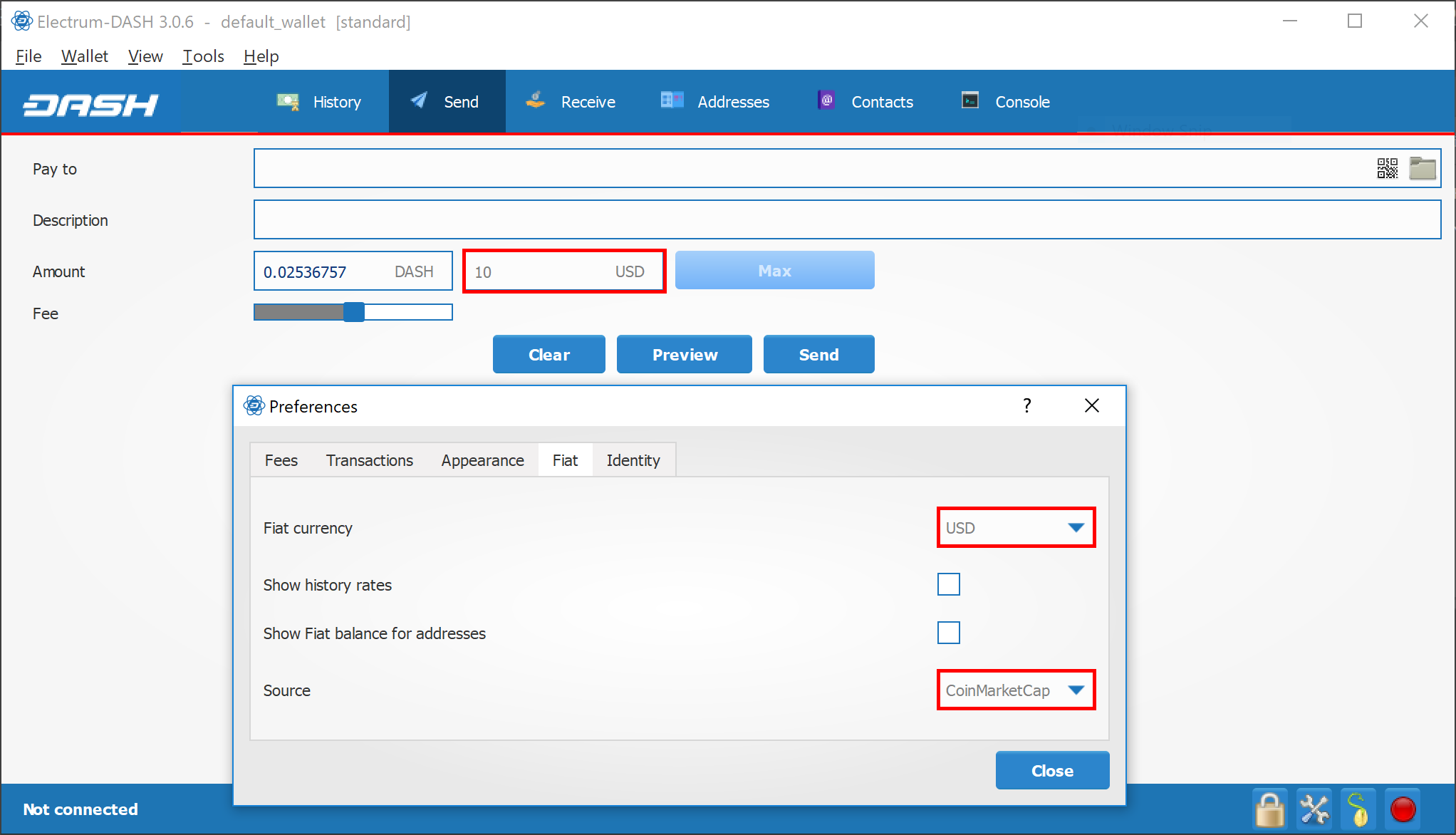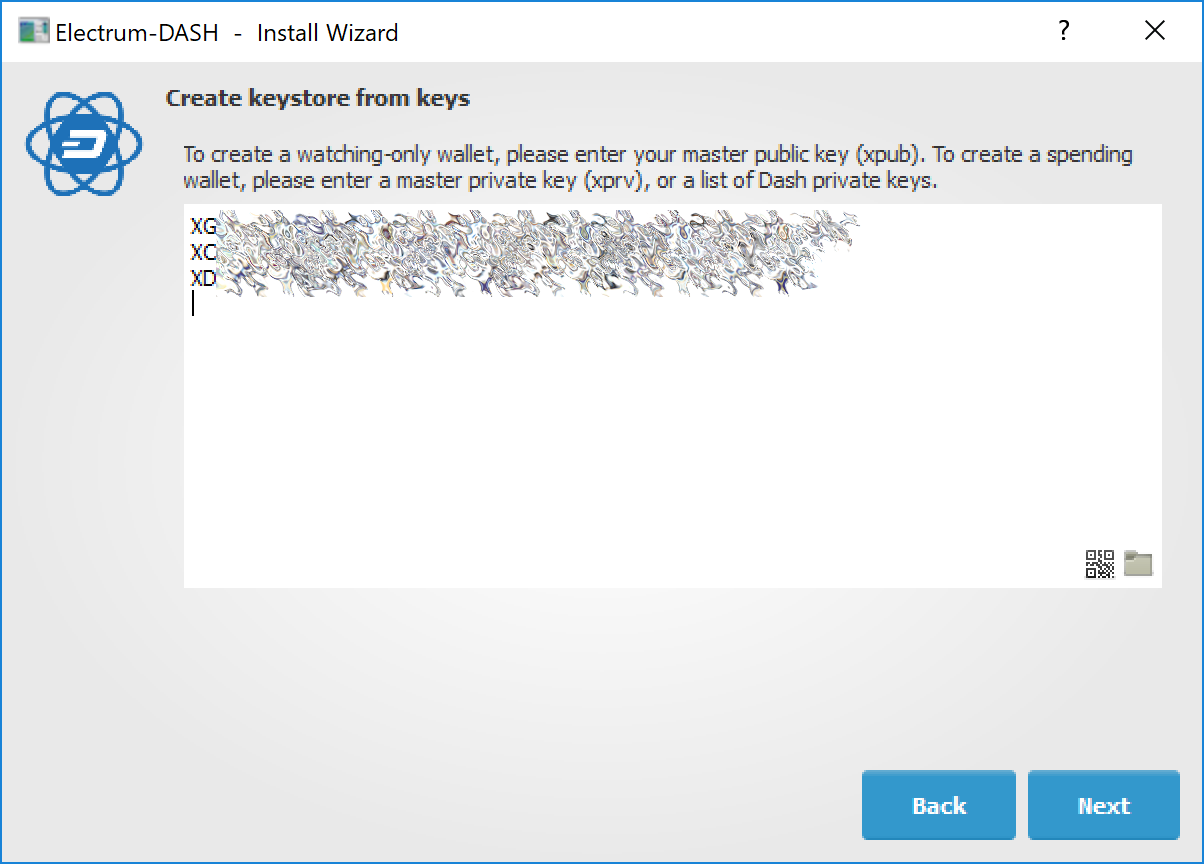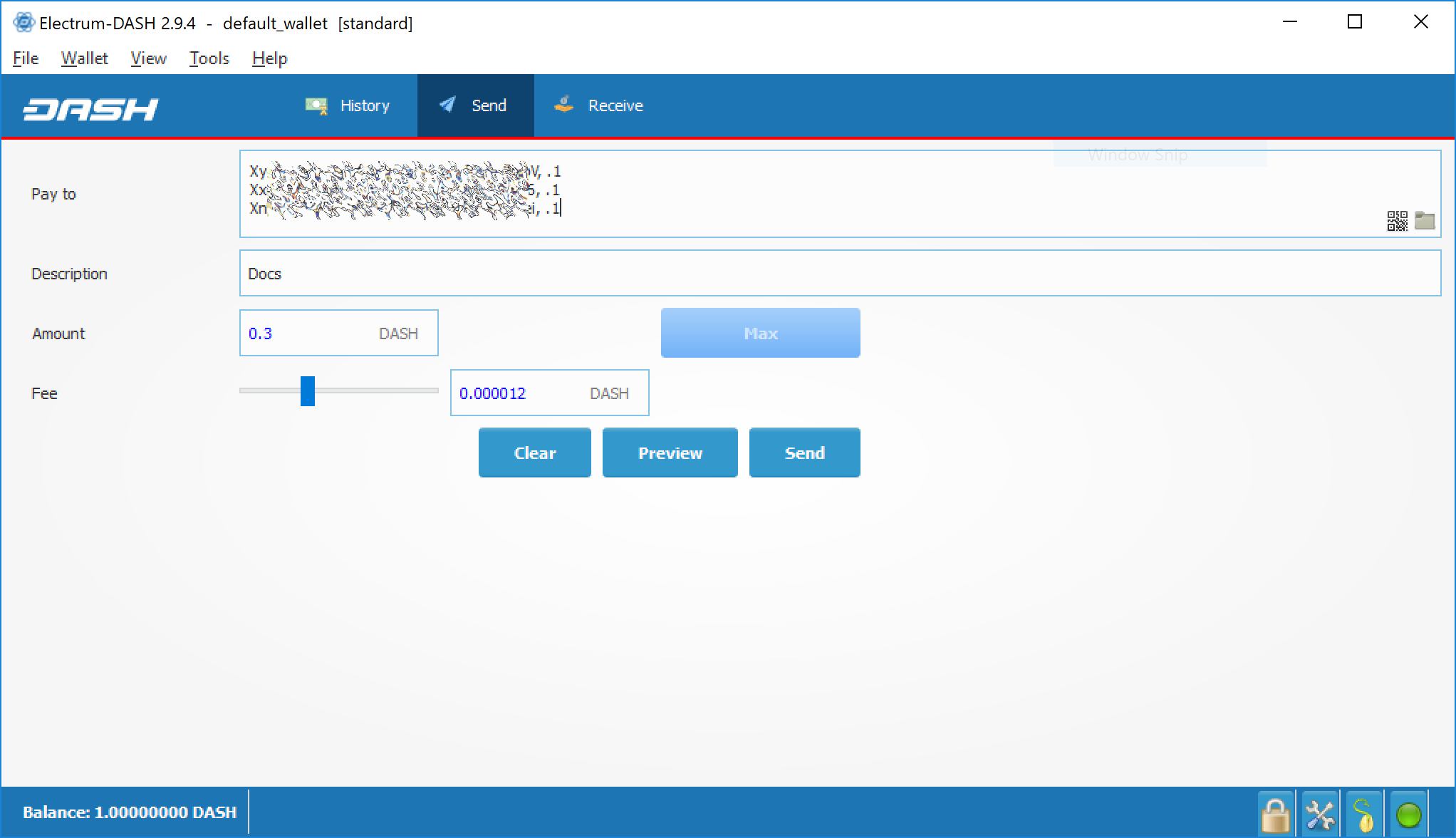Frequently Asked Questions¶
How does Dash Electrum work?¶
Dash Electrum focuses on speed, low resource usage and providing a simple user experience for Dash. Startup times are instant because it operates in conjunction with high-performance servers that handle the most complicated parts of the Dash system.
Does Dash Electrum trust servers?¶
Not really; the Dash Electrum client never sends private keys to the servers. In addition, it verifies the information reported by servers using a technique called Simple Payment Verification.
What is the Seed?¶
The seed is a random phrase that is used to generate your private keys. Example:
constant forest adore false green weave stop guy fur freeze giggle clock
Your wallet can be entirely recovered from its seed. To do this, select the I already have a seed option during startup.
How secure is the seed?¶
The seed created by Dash Electrum has 128 bits of entropy. This means that it provides the same level of security as a Dash private key (of length 256 bits). Indeed, an elliptic curve key of length n provides n/2 bits of security.
What are change addresses?¶
The Dash Electrum wallet design and workflow are based on a concept called a “wallet generation seed”. This seed is a unique, randomly- selected list of twelve words. A Dash Electrum wallet uses its seed as a template for generating addresses.
To understand the problem that seeds solve, browse to the Electrum Receive tab. Next, open the collapsible entry marked Change.

Receiving and change addresses in Dash Electrum¶
Notice that the total balance does not only show the sum of all receiving addresses, but also the separately listed Change addresses. Where did these new change addresses come from and why does the first one now hold funds?
Dash is an electronic cash system, meaning that it shares much in common with the process of using paper banknotes. Although some cash payments involve exact change, many do not. You tend to “overpay” when using cash, and expect to receive the difference as change. Perhaps surprisingly, this is how Dash transactions work as well. If the entire balance of an address is not required for any given transaction, the remainder is sent to a new and unused address under control of the same wallet. This address is generated deterministically (rather than randomly) from the wallet seed, which means that any other wallet will also regenerate the change addresses in the same order from the same recovery seed, and have access to the balances.
Spending the entire balance and sending any remainder to a change address is considered good practice because it prevents the transaction recipient from linking transactions by browsing the blockchain, thus compromising your privacy. If privacy is not a concern, change addresses can be disabled via the Tools > Electrum preferences menu option.
How can I send the maximum available in my wallet?¶
Type an exclamation mark (!) in the Amount field or simply click the Max button. The fee will be automatically adjusted for that amount.
How can I send Dash without paying a transaction fee?¶
You can create a zero fee transaction in the GUI by following these steps:
Enable the Edit fees manually option
Enter 0 in the Fee field
Enter the amount in the Amount field
Note that transactions without fees might not be relayed by the Dash Electrum server, or by the Dash network.
Is there a way to enter amounts in USD in Dash Electrum?¶
Yes, go to Tools > Prefernce > Fiat and select a Fiat currency to display the current exchange rate from the chosen Source.

Entering values in fiat currency in Dash Electrum¶
What does it mean to “Freeze” an address in Dash Electrum?¶
When you freeze an address, the funds in that address will not be used for sending Dash. You cannot send Dash if you don’t have enough funds in your non-frozen addresses.
How is the wallet encrypted?¶
Dash Electrum uses two separate levels of encryption:
Your seed and private keys are encrypted using AES-256-CBC. The private keys are decrypted only briefly, when you need to sign a transaction; for this you need to enter your password. This is done in order to minimize the amount of time during which sensitive information is unencrypted in your computer’s memory.
In addition, your wallet file may be encrypted on disk. Note that the wallet information will remain unencrypted in the memory of your computer for the duration of your session. If a wallet is encrypted, then its password will be required in order to open it. Note that the password will not be kept in memory; Dash Electrum does not need it in order to save the wallet on disk, because it uses asymmetric encryption (ECIES).
Wallet file encryption is activated by default since version 2.8. It is intended to protect your privacy, but also to prevent you from requesting Dash on a wallet that you do not control.
I have forgotten my password but still have my seed. Is there any way I can recover my password?¶
It is not possible to recover your password. However, you can restore your wallet from its seed phrase and choose a new password. If you lose both your password and your seed, there is no way to recover your money. This is why we ask you to save your seed phrase on paper.
To restore your wallet from its seed phrase, create a new wallet, select the type, choose I already have a seed and proceed to input your seed phrase.
Does Dash Electrum support cold wallets?¶
Yes. See the cold storage section.
Can I import private keys from other Dash clients?¶
In Dash Electrum 2.0, you cannot import private keys in a wallet that has a seed. You should sweep them instead.
If you want to import private keys and not sweep them you need to create a special wallet that does not have a seed. For this, create a new wallet, select Use public or private keys, and instead of typing your seed, type a list of private keys, or a list of addresses if you want to create a watching-only wallet. A master public (xpub) or private (xprv) will also work to import a hierarchical deterministic series of keys. You will need to back up this wallet, because it cannot be recovered from seed.

Importing a list of private keys to create a wallet¶
Can I sweep private keys from other Dash clients?¶
Sweeping private keys means to send all the Dash they control to an existing address in your wallet. The private keys you sweep do not become a part of your wallet. Instead, all the Dash they control are sent to an address that has been deterministically generated from your wallet seed.
To sweep private keys go to Wallet > Private Keys > Sweep. Enter the private keys in the appropriate field. Leave the Address field unchanged. This is the destination address from your existing Dash Electrum wallet. Click on Sweep. Dash Electrum then takes you to the Send tab where you can set an appropriate fee and then click on Send to send the coins to your wallet.
Where is my wallet file located?¶
The default wallet file is called default_wallet and is created when you first run the application. It is located under the /wallets folder.
Linux: Open Files, select Go > Go to folder, copy the path
~/.electrum-dashand paste it into the dialog boxmacOS: Open Finder, select Go > Go to Folder, copy the path
~/.electrum-dashand paste it into the dialog boxWindows: Open Explorer, copy the path
%APPDATA%\Electrum-DASHand paste it in to the address bar
Can I do bulk payments with Dash Electrum?¶
You can create a transaction with several outputs. In the GUI, type each address and amount on a line, separated by a comma.

Creating a transaction with multiple outputs in Dash Electrum¶
Amounts are in the current unit set in the client. The total is shown in the GUI. You can also import a CSV file in the Pay to field by clicking on the folder icon.
Can Dash Electrum create and sign raw transactions?¶
Dash Electrum lets you create and sign raw transactions right from the user interface using a form.
Dash Electrum freezes when I try to send Dash¶
This might happen if you are trying to spend a large number of transactions outputs (for example, if you have collected hundreds of donations from a Dash faucet). When you send Dash, Dash Electrum looks for unspent coins that are in your wallet in order to create the new transaction. Unspent coins can have different values, much like physical coins and bills.
If this happens, you should consolidate your transaction inputs by sending smaller amounts of Dash to one of your wallet addresses; this would be the equivalent of exchanging a stack of nickels for a dollar bill.
What is the gap limit?¶
The gap limit is the maximum number of consecutive unused addresses in your deterministic sequence of addresses. Dash Electrum uses it in order to stop looking for addresses. In Dash Electrum 2.0, it is set to 20 by default, so the client will get all addresses until 20 unused addresses are found.
How can I pre-generate new addresses?¶
Dash Electrum will generate new addresses as you use them, until it hits the gap limit.
If you need to pre-generate more addresses, you can do so by typing wallet.create_new_address() in the console. This command will generate one new address. Note that the address will be shown with a red background in the address tab, to indicate that it is beyond the gap limit. The red color will remain until the gap is filled.
WARNING: Addresses beyond the gap limit will not automatically be recovered from seed. To recover them will require either increasing the client’s gap limit or generating new addresses until the used addresses are found.
If you wish to generate more than one address, you may use a ‘for’ loop. For example, if you wanted to generate 50 addresses, you could do this:
for x in range(0, 50):
print wallet.create_new_address()
How to upgrade Dash Electrum?¶
Warning: always save your wallet seed on paper before doing an upgrade.
To upgrade Dash Electrum, just install the most recent version. The way to do this will depend on your OS. Note that your wallet files are stored separately from the software, so you can safely remove the old version of the software if your OS does not do it for you.
Some Dash Electrum upgrades will modify the format of your wallet files. For this reason, it is not recommended to downgrade Dash Electrum to an older version once you have opened your wallet file with the new version. The older version will not always be able to read the new wallet file.
The following issues should be considered when upgrading Dash Electrum 1.x wallets to Dash Electrum 2.x:
Dash Electrum 2.x will need to regenerate all of your addresses during the upgrade process. Please allow it time to complete, and expect it to take a little longer than usual for Dash Electrum to be ready.
The contents of your wallet file will be replaced with a Dash Electrum 2 wallet. This means Dash Electrum 1.x will no longer be able to use your wallet once the upgrade is complete.
The Addresses tab will not show any addresses the first time you launch Dash Electrum 2. This is expected behaviour. Restart Dash Electrum 2 after the upgrade is complete and your addresses will be available.
Offline copies of Dash Electrum will not show the addresses at all because it cannot synchronize with the network. You can force an offline generation of a few addresses by typing the following into the Console: wallet.synchronize(). When it’s complete, restart Dash Electrum and your addresses will once again be available.